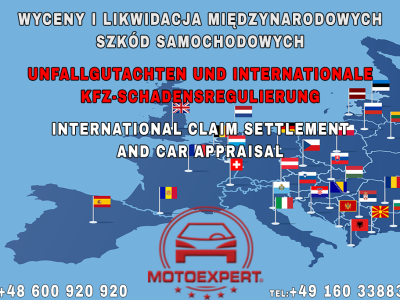In the realm of vehicle damage valuation, accuracy is paramount. At Expert MOTOEXPERT, we specialize in providing superior auto appraisal services, assisting clients with thorough car damage assessments. With our expertise, you can trust that your damaged vehicle will be evaluated with precision, ensuring a fair and accurate valuation.
When it comes to the preparation of a technical opinion, our team at Expert MOTOEXPERT follows a meticulous process to deliver reliable assessments. Each case is handled by our experienced professionals who meticulously examine the vehicle’s condition, considering various factors to determine the appropriate valuation. This intricate process requires careful attention to detail and a comprehensive approach.
Our experts thoroughly inspect the vehicle, meticulously evaluating visible damages as well as assessing the condition of internal components. This detailed assessment enables us to provide an accurate valuation that reflects the true extent of the damage.
Additionally, our team at Expert MOTOEXPERT understands the importance of collecting necessary documentation to support the valuation process. We work closely with our clients to ensure all relevant paperwork is obtained, providing a comprehensive overview of the vehicle’s history and condition.
Furthermore, we recognize that each case is unique and may require additional steps and analysis. Our technical opinion is tailored to meet the specific requirements of your situation, ensuring a comprehensive and accurate assessment.
At Expert MOTOEXPERT, we pride ourselves on our efficiency and dedication to delivering timely results. The preparation of a technical opinion is conducted promptly, allowing you to proceed with the valuation process swiftly and seamlessly.
Trust in Expert MOTOEXPERT for all your vehicle damage valuation needs. Our experienced professionals, meticulous approach, and dedication to accuracy make us the leading vehicle appraisal company in the industry.
Key Takeaways:
- Expert MOTOEXPERT offers superior auto appraisal services and accurate car damage assessments.
- Our team follows a meticulous process to ensure reliable and thorough technical opinions.
- We conduct detailed inspections to assess visible damages and internal components.
- Collecting necessary documentation is crucial for supporting the valuation process.
- Our technical opinions are tailored to meet the unique requirements of each case.
Understanding Vehicle Damage Valuation
Before delving into the specifics, it is important to understand the basics of vehicle damage valuation. This section will explain the process of collision damage estimation and total loss calculation, providing you with a solid foundation for accurate valuation.
When it comes to assessing the extent of damage to a vehicle, collision damage estimation is a crucial step. This involves evaluating both the visible and underlying damage caused by a collision. Skilled professionals utilize their expertise and knowledge to carefully examine the vehicle’s exterior, interior, and mechanical components to determine the extent of the collision damage.
Furthermore, assessing whether a vehicle is a total loss requires a meticulous calculation process. Total loss calculation takes into account various factors such as the market value of the vehicle, the cost of repairs, and the salvage value. This calculation helps determine whether the cost of repairing the vehicle exceeds its actual value, in which case it is considered a total loss.
„Accurate vehicle damage valuation is crucial for both insurance claims and vehicle assessments. Collision damage estimation and total loss calculation provide a comprehensive understanding of the damage incurred and help determine the appropriate course of action.“
Having a clear understanding of the vehicle damage valuation process allows you to make informed decisions regarding repairs, insurance claims, and potential resale value. Whether you are an insurance adjuster, a collision repair specialist, or a vehicle owner, this knowledge is invaluable in ensuring fair and accurate assessments.
To further illustrate the process of vehicle damage valuation, let’s consider an example:
Example: Collision Damaged Vehicle
| Vehicle Information | Condition | Estimated Repair Cost |
|---|---|---|
| Make: Toyota | Collision damage: Front-end | $10,000 |
| Model: Camry | Engine damage: Partial | |
| Year: 2018 | Safety systems: Deployed airbags |
In this example, a collision-damaged Toyota Camry is being assessed for repair. The front-end collision caused significant damage to the vehicle’s exterior, and there is partial engine damage. Additionally, the safety systems, such as the airbags, were deployed. The estimated repair cost is $10,000.
By understanding the process of collision damage estimation and total loss calculation, you can make well-informed decisions based on the severity and costs associated with the vehicle damage.
Next, in Section 3: The Role of Insurance Claims and Appraisals, we will explore the significance of insurance claim evaluation and the services provided by loss adjusters in the vehicle damage valuation process.
The Role of Insurance Claims and Appraisals
Insurance claim evaluation and loss adjuster services are indispensable components of the vehicle damage valuation process. When assessing the extent of damage and determining the appropriate value for a damaged vehicle, insurance claims and appraisals provide crucial insights and expertise.
During an insurance claim evaluation, the insurance company assesses the damage to determine if it falls within the policy’s coverage parameters. This evaluation helps establish the scope of the claim and ensures that the appropriate compensation is provided. Insurance claim evaluators have the knowledge and experience to accurately assess the damage, considering factors such as the vehicle’s condition, age, and pre-accident value.
„Insurance claim evaluation enables a fair and objective assessment of the vehicle damage, ensuring that policyholders receive proper compensation for their losses.“ – [Insurance Company Name]
Loss adjusters, on the other hand, are professionals who facilitate the entire insurance claims process. They work on behalf of the insurance company to investigate claims, evaluate damages, and determine liability. Loss adjusters play a critical role in ensuring a smooth and efficient claims settlement process, protecting the interests of both the policyholder and the insurance company.
Having loss adjuster services available can significantly streamline the vehicle damage valuation process. These professionals possess in-depth knowledge of the insurance industry and related legal frameworks, allowing them to navigate complex situations and provide expert guidance to all parties involved.
By understanding the role of insurance claims and appraisals, individuals undergoing the vehicle damage valuation process can make informed decisions and secure a fair compensation for their losses.
Hiring Automotive Valuation Experts
When it comes to accurately valuing vehicle damage, the expertise of automotive valuation experts cannot be understated. At [Our Company], we understand the complexities involved in assessing the true value of a damaged vehicle. Our team of highly skilled and experienced automotive valuation experts is dedicated to providing comprehensive assessment services that align with industry standards and regulations.
„Accurate vehicle damage valuation requires a deep understanding of various factors such as the extent of damage, market trends, and the specific make and model of the vehicle. It’s not simply about estimating the cost of repairs; it’s about determining the fair value considering various parameters.“
By hiring automotive valuation experts, you can benefit from their in-depth knowledge and access to specialized tools and databases. They possess the expertise to evaluate the damage accurately, taking into account all the relevant factors that influence the value of a vehicle. Whether it’s assessing damages due to accidents, natural disasters, or other incidents, their proficiency enables them to provide you with a reliable and unbiased valuation.
Moreover, automotive valuation experts stay updated with the latest industry trends, market values, and regulations. This knowledge allows them to provide you with an accurate assessment that aligns with current market conditions. They can also advise you on the measures to take to maximize the value of your damaged vehicle, whether through repairs or salvage options.
When it comes to finding a reliable expert, consider the following tips:
- Research and choose a reputable company or individual with proven experience in vehicle damage assessment and valuation.
- Check for certifications or affiliations with professional organizations that ensure adherence to industry standards and best practices.
- Read reviews and testimonials from previous clients to gauge the quality of their services and customer satisfaction.
- Request a consultation or initial assessment to discuss your specific case and assess their expertise and communication skills.
By entrusting your vehicle damage valuation to automotive valuation experts, you can ensure a fair and accurate assessment that will benefit you in insurance claims, legal proceedings, or any other situations where determining the true value of your vehicle is essential.
Customer Testimonial
„I was facing a challenging situation after my car was involved in a serious accident. Thanks to [Our Company] and their team of automotive valuation experts, I received a detailed and accurate assessment of the damage. Their professionalism, knowledge, and attention to detail were outstanding. I highly recommend their services to anyone in need of reliable vehicle damage valuation experts.“
– Sarah Thompson, satisfied client
Image
Collecting Necessary Documentation
To ensure an accurate valuation, it is essential to gather all the necessary documentation. Whether you are conducting the valuation yourself or working with a trusted vehicle appraisal company, having the right information at hand is crucial. Here are the types of documents you should gather:
1. Vehicle Information
Start by gathering all the relevant information about the vehicle in question. This includes the make, model, year, VIN (Vehicle Identification Number), and any additional features or modifications. Having accurate vehicle information helps in conducting a thorough appraisal.
2. Maintenance and Repair Records
Next, collect the maintenance and repair records for the vehicle. These records provide valuable insights into the vehicle’s history, including any past damages, repairs, or modifications. They also help establish the overall condition and maintenance history of the vehicle.
3. Accurate Mileage Records
Accurate mileage records are essential in determining the vehicle’s overall usage and wear and tear. Collect records such as service receipts, mileage logs, and any other documented mileage information.
4. Insurance Policies and Claims
If the vehicle has been involved in any previous accidents or incidents, gather relevant insurance policies and past insurance claim records. These documents help establish the history of damages and repairs, providing valuable context for the appraisal process.
5. Title and Ownership Documents
Ensure you have the vehicle title and ownership documents readily available. These documents establish legal ownership and are crucial for confirming the legitimacy of the appraisal process, especially if working with a vehicle appraisal company.
6. Any Relevant Legal or Mental Damage Assessments
In some cases, legal or mental damage assessments may be needed for the valuation process. If applicable, gather any relevant legal documents, such as court orders or official evaluations, to provide a complete picture of the vehicle’s condition.
Make sure to gather all the necessary documentation for an accurate vehicle damage valuation. It is the foundation for a fair and reliable appraisal, whether you rely on a vehicle appraisal company or conduct the valuation yourself.
To ensure a smooth and effective collaboration with a vehicle appraisal company, it’s essential to maintain good communication and provide all the requested documentation promptly. By doing so, you enable the professionals to conduct a thorough evaluation and deliver an accurate valuation.
| Types of Documents | Importance |
|---|---|
| Vehicle Information | Establishes the basic details of the vehicle being appraised. |
| Maintenance and Repair Records | Provides insights into the vehicle’s history and condition. |
| Accurate Mileage Records | Helps assess the usage and wear and tear of the vehicle. |
| Insurance Policies and Claims | Establishes the history of damages and repairs. |
| Title and Ownership Documents | Confirms legal ownership and legitimacy of the appraisal process. |
| Relevant Legal or Mental Damage Assessments | Provides additional context for the vehicle’s condition. |
Evaluating Vehicle Damage
The evaluation of vehicle damage is a critical step in accurately assessing the extent of the damage. In this section, we will provide you with a step-by-step guide on conducting a thorough car damage assessment. Whether you’re a car owner, insurance adjuster, or automotive professional, understanding the assessment process is essential for determining the appropriate repairs and estimating the true value of the vehicle.
Step 1: Visual Inspection
The first step in evaluating vehicle damage is conducting a visual inspection of the exterior. Look for signs of visible damage, such as dents, scratches, or broken parts. Pay attention to the condition of the paint, windows, lights, and mirrors. It’s important to document these damages and take clear photographs to support your assessment.
Step 2: Diagnostic Scanning
In some cases, it’s necessary to perform a diagnostic scan on the vehicle to assess any potential hidden damage to its electronic systems. Diagnostic scanning allows you to identify any error codes or issues that may require further inspection or repairs. This step is particularly important for modern vehicles with advanced technology.
Step 3: Mechanical and Structural Assessment
Next, you’ll need to assess the mechanical and structural components of the vehicle. This includes checking the engine, suspension, steering, brakes, and frame for any damage or malfunctions. A comprehensive evaluation will help identify any underlying issues that may affect the vehicle’s safety and performance.
Step 4: Documentation and Reporting
Throughout the assessment process, it’s crucial to document your findings accurately. Take detailed notes, record measurements, and capture clear photographs to support your assessment. This documentation will serve as evidence and contribute to the overall valuation of the vehicle. Additionally, create a comprehensive report summarizing the damages and repairs required.
Step 5: Consultation and Expert opinion
In complex cases or if you’re uncertain about the assessment, consider consulting an automotive expert or a trusted vehicle appraisal company. Their expertise and experience can provide valuable insights and ensure an accurate evaluation of the vehicle’s damage. Their objective opinion will contribute to your final assessment and help you make informed decisions.
Step 6: Determining Repair Cost
Based on the assessment findings, you can determine the estimated repair costs. Consider factors such as the parts required, labor, and any additional services needed. Consulting with an experienced mechanic or repair shop can provide a more accurate estimate of the repair cost.
Evaluating vehicle damage requires a careful and meticulous approach to ensure an accurate assessment. By following these steps and gathering all the necessary information, you can confidently determine the extent of the damage and make informed decisions regarding repairs, insurance claims, or the overall value of the vehicle.
| Step | Description |
|---|---|
| Step 1 | Visual Inspection |
| Step 2 | Diagnostic Scanning |
| Step 3 | Mechanical and Structural Assessment |
| Step 4 | Documentation and Reporting |
| Step 5 | Consultation and Expert opinion |
| Step 6 | Determining Repair Cost |
Factors Affecting Vehicle Damage Valuation
When it comes to valuing vehicle damage, it’s important to consider the various factors that can impact the valuation process. By understanding these elements, you’ll be better equipped to determine the accurate value of a damaged vehicle.
One of the key factors affecting vehicle damage valuation is the extent of the damage itself. The severity of the damage, whether it’s minor cosmetic issues or major structural damage, can significantly impact the overall value. Additionally, the age of the vehicle and its mileage are also taken into consideration.
Another factor to consider is the availability of replacement parts. If the damaged vehicle requires rare or expensive parts, the valuation may be higher due to the added cost of repairs.
The condition of the vehicle prior to the damage is essential in determining its value. A well-maintained vehicle with minimal wear and tear will generally have a higher valuation compared to one that has been poorly maintained.
„The condition and history of the vehicle are crucial in accurately valuing the damage. A comprehensive inspection and assessment are essential to determine the true value.“
Other factors that can affect vehicle damage valuation include the market demand for similar vehicles and any prior accidents or damage history. It’s important to take into account these factors when determining the accurate value of a damaged vehicle.
In summary, vehicle damage valuation is a comprehensive process that takes into account various factors. By working with a reputable vehicle appraisal company, you can ensure a thorough assessment that considers all the relevant elements. This will result in an accurate valuation that can aid in insurance claims, appraisals, and any other situations involving damaged vehicles.
Factors Affecting Vehicle Damage Valuation:
| Factors | Impact |
|---|---|
| Extent of Damage | Affects value based on severity |
| Age and Mileage | Taken into consideration |
| Availability of Replacement Parts | Rare parts can increase valuation |
| Condition and Maintenance | Well-maintained vehicles have higher value |
| Market Demand | Affects value based on supply and demand |
| Prior Accidents or Damage History | Taken into consideration |
Verifying the Total Loss Calculation
When a vehicle is deemed a total loss, it is crucial to ensure that the total loss calculation is accurate. By following the steps outlined below, you can verify the calculation and ensure a fair evaluation.
- Gather all relevant documentation: Before proceeding with the verification process, collect all the necessary documents related to the valuation of your vehicle. This may include repair estimates, insurance policies, and any other supporting paperwork.
- Review the valuation report: Carefully analyze the valuation report provided by the appraiser or insurance company. Pay close attention to the details, including the assessed value of the vehicle, any deductibles or salvage value accounted for, and the method used for the total loss calculation.
- Research market values: Conduct thorough research on the current market values of comparable vehicles in your area. This will help you determine if the assessed value aligns with prevailing market prices.
Quote:
„Verifying the total loss calculation is essential to ensure that you receive a fair evaluation for your damaged vehicle.“ – [Your Name]
If you have any doubts or concerns regarding the total loss calculation, consider seeking a second opinion from an independent appraiser to validate the appraisal. Additionally, you can consult legal resources or contact industry professionals who specialize in vehicle damage valuation for further guidance.
Remember, being proactive in verifying the total loss calculation will help you protect your interests and ensure a fair outcome. Don’t hesitate to ask questions and seek clarification throughout the process.
Dealing with Insurance Companies
When it comes to the vehicle damage valuation process, interacting with insurance companies can sometimes feel like a daunting task. However, with the right strategies and tips, you can navigate this aspect of the appraisal and claim evaluation experience smoothly. Our comprehensive guide aims to help you effectively deal with insurance companies, ensuring a seamless process from start to finish.
Communicate Clearly and Concisely
Insurance claim evaluation requires open and effective communication. When interacting with insurance companies, it’s crucial to convey your message clearly and concisely. Use simple language and avoid jargon or technical terms that may lead to confusion. Articulate the details of the vehicle damage, emphasizing its impact on the value. The accuracy of your information will provide the insurer with a better understanding of the situation and facilitate faster claim evaluation.
Provide Comprehensive Documentation
To support your insurance claim evaluation, it’s essential to provide comprehensive documentation. Gather all relevant documents related to the incident, including photographs, repair estimates, and any other evidence that showcases the extent of the damage. By presenting a thorough collection of documentation, you provide the insurance company with the necessary information to assess the value accurately.
Negotiate Fairly and Professionally
During the valuation process, negotiations with the insurance company may be required to reach a fair settlement. Approach these negotiations with professionalism and a clear understanding of the value of the vehicle damage. Research comparable cases and present a strong argument, highlighting any unique features or factors that may affect the value. By negotiating fairly and professionally, you increase the likelihood of a favorable outcome.
Insurance claim evaluation requires patience and a calm demeanor. Remember, insurance adjusters are also trained professionals, and maintaining a respectful and cooperative attitude can go a long way. Take the time to listen to their perspectives and respond thoughtfully. This collaborative approach can lead to a more amicable resolution.
Seek Expert Advice, if necessary
If you encounter challenges or complexities during the insurance claim evaluation process, don’t hesitate to seek expert advice. Consulting a reputable vehicle appraisal company or a professional loss adjuster can provide valuable insights and guidance. These experts have the knowledge and experience to navigate the intricacies of insurance claims and can advocate for your best interests throughout the process.
By effectively dealing with insurance companies during the vehicle damage valuation process, you can ensure a smoother appraisal and claim evaluation experience. Follow our tips and strategies, communicate clearly, provide comprehensive documentation, negotiate fairly and professionally, and seek expert advice when needed. With these approaches, you can navigate the insurance claim evaluation process with confidence and achieve an accurate and fair outcome.
Common Challenges in Dealing with Insurance Companies
| Challenges | Strategies |
|---|---|
| 1. Limited communication | Establish clear communication channels and provide regular updates |
| 2. Delayed response | Set clear expectations and follow up promptly |
| 3. Disputes over valuation | Gather supporting evidence and negotiate based on comparable cases |
| 4. Insufficient documentation | Ensure all necessary documentation is provided in a timely manner |
| 5. Uncooperative behavior | Maintain a respectful and professional attitude throughout the process |
Conclusion
In conclusion, accurately valuing vehicle damage is a crucial aspect of navigating insurance claims and appraisals. Our comprehensive guide has provided you with expert advice and information to approach the valuation process with confidence.
Whether you require the services of automotive valuation experts or are conducting a car damage assessment yourself, following these insights will help ensure an accurate and fair outcome. Trust in our expertise and experience clarity in vehicle damage valuation.
By understanding the process of collision damage estimation, total loss calculation, and the role of insurance claims and appraisals, you can effectively navigate the valuation process. Gathering necessary documentation, evaluating vehicle damage meticulously, and considering the factors that affect valuation are essential steps toward an accurate appraisal.
Dealing with insurance companies may be challenging, but by following our tips and strategies, you can optimize your interactions and ensure a smooth appraisal and claim evaluation experience. Remember, accurate valuation is the key to a fair outcome.






